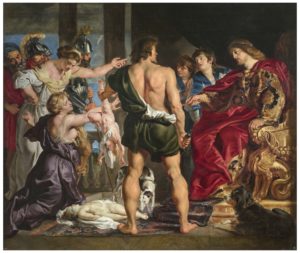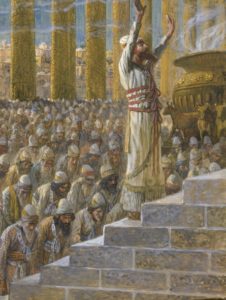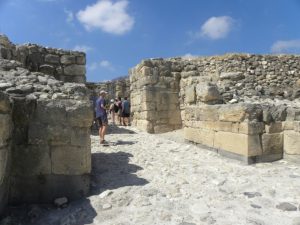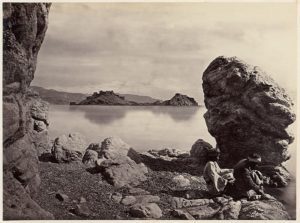When David died, his son Solomon succeeded him on the throne.
At the beginning of his reign, Solomon went to Gibeon to offer sacrifices to God, and there he asked for wisdom. The Lord granted it him to such an extraordinary degree that Solomon became the biblical prototype of a wise king.

The Judgment of Solomon, Prado Museum
His ability to discern and, therefore, to govern, is demonstrated in the story of the two mothers who lived together and disputed before Solomon’s court over a child who had survived after the other had been crushed by his mother while she slept. “The king said, ‘Get me a sword.’ When they brought the sword before the king, he said, ‘Cut the living child in two, and give half to one woman, and half to the other.’ The woman whose son was alive, because she was stirred with compassion for her son, said to the king, ‘Please, my lord, give her the living baby—do not kill it!’ But the other said, ‘It shall be neither mine nor yours—cut it in two!’ The king then answered, ‘Give her the living baby! Do not kill it! She is the mother’” (1 Kgs 3:24-27).

Solomon Dedicates the Temple at Jerusalem by James Tissot
This wisdom was also evident in the organization of the kingdom, as Solomon relied on the collaboration of the necessary ministers, secretaries, and stewards, and also established an effective system for tax collection.
A notable aspect of his reign was the development of maritime trade. In 1 Kings 9:26, it is noted that Solomon built a fleet at Ezion-geber (Elath), and that Hiram of Tyre’s servants constituted the crew, along with Solomon’s men. Excavations at Ezion-geber have uncovered the ruins of a large factory for copper production, dating to Solomon’s time. Solomon also promoted the building of great structures throughout the kingdom: he extended the walls of Jerusalem (1 Kgs 9:15) and significantly strengthened the fortresses of Hazor, Megiddo, and Gezer (1 Kgs 9:15).
His greatest work was the construction of a Temple in Jerusalem dedicated to the Lord. To accomplish this, he sought the support of Hiram, king of Tyre, to obtain the necessary timber for construction, he recruited laborers, and arranged for the means by which they could perform their work (1 Kgs 5:15-32). Once completed, a solemn dedication took place, during which he presented burnt offerings, grain offerings, and sacrifices (1 Kgs 8:1-66), preceded by words of thanksgiving to the Lord and a beautiful prayer.

Chambered Gate of Megiddo by Ian Scott
This long and solemn prayer is an admirable model of prayer, as recognized by the Catechism of the Catholic Church: “The prayer of the dedication of the Temple relies on God’s promise and covenant, on the active presence of his name among his People, recalling his mighty deeds at the Exodus. The king lifts his hands toward heaven and begs the Lord, on his own behalf, on behalf of the entire people, and of the generations yet to come, for the forgiveness of their sins and for their daily needs, so that the nations may know that He is the only God and that the heart of his people may belong wholly and entirely to him.” (CCC 2580).

On the Red Sea Near Ezion-Geber Port of King Solomon, by Frank Mason Good
Nevertheless, after many years, Solomon’s heart became corrupted by loving many foreign women who led him into idolatry, and to abandon the Lord in the final days of his life. After reigning for forty years, Solomon died (1 Kgs 11:1-43).
By father Francisco Varo, Priest
